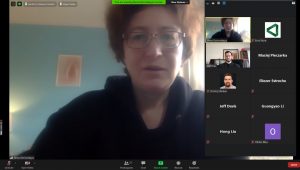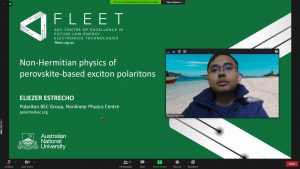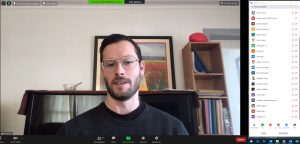A two-day live-streamed workshop brought 30 researchers from across FLEET together last week, organised by ANU Research Fellows Maciej Pieczarka and Eliezer Estrecho.
FLEET’s second research theme uses a quantum state known as a superfluid to achieve electrical current flow with minimal wasted dissipation of energy.
In a superfluid, scattering is prohibited by quantum statistics, and all particles flow with the same momentum, and no energy is lost to other motion – thus, electrical current can flow without resistance. Particles and quasi-particles, including both excitons and exciton-polaritons, can form a superfluid.
Researchers are seeking to create superfluid flows using three approaches:
- Exciton-polariton bosonic condensation in atomically-thin materials
- Topologically-protected exciton-polariton flow
- Exciton superfluids in twin-layer materials.
Eight presentations from research fellows, students and investigators from four nodes (ANU, Swinburne, UQ and Monash) covered both theoretical and experimental aspects of the theme.
Eliezer Estrecho: “In some ways, a digital conference is easier to organise, since we don’t need to worry about accommodation and flights, saving us travel expenses. But we do miss the intense face-to-face discussions between talks and after the sessions. Nevertheless, we found the discussion very useful – in fact, it was quite lively and stimulating, more so even that last year’s in-person conference!”
Co-organiser Maciej Pieczarka explains one of the ways organisers helped reduce ‘digital fatigue’: “Although it was easier to organise a virtual workshop with the help of modern technology, it was much more challenging to keep the discussions as intense as in face-to-face meetings. I think we succeeded and the workshop was very useful and intense. Personally, I find online workshops as valuable as the regular ones, but surprisingly, the online workshops are very exhausting. Thus, we incorporated long, 30-minute breaks between each one-hour talk, in a bid to reduce ‘zoom fatigue’.”




